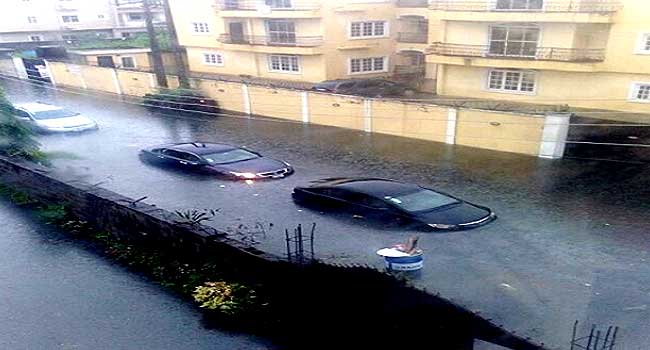Is this the first time there would be rainy season in Lagos? No.
For how long has this been happening where rain would fall and flood would happen? Over 5 years
So why does it seem like a surprise every time it happens? I don’t know
Were we ready? It doesn’t look like it
Variants of these questions and answers have been mentioned in the past few days following the recent downpour leading to flooding in some parts of Lagos. Since this is not the first or second time this is occurring in Lagos, why isn’t there an emergency response plan being followed? If there is such a plan, are the people living in affected areas aware of what is expected of them? Or are we not yet treating this as an emergency? Since we expect the rain to fall every year and the State is aware of the diverse challenges in those specific areas, shouldn’t there be a relief plan while a permanent solution is being worked on?

A message is being circulated on social media asking people to move upland. Upland where exactly? Whose house? What if they have no one whose place they can move to? Has the populace been educated that in times like this, there are certain steps to take one of which would be opening homes to affected neighbours? Is there a makeshift centre to provide shelter and food temporarily? You do not just ask people to move upland without specific instructions or say stay indoors. Did you advise them to stockpile earlier on food and necessities? If they do not have things prepared, even with advice to stay indoors, they would go out because they would need to survive somehow. In other countries, areas that are prone to environmental disasters have an emergency response plan. Citizens are taught how to recognise signs, how to act and even how to evacuate. These seemingly little things are the differences between survival and full-scale disaster. How many homes have an emergency response kit to fit the type of emergency that could occur in their terrain? Are they even aware of the type of emergency peculiar to where they live. We need to carry the people along in emergency planning. Just because we do not have the kind of natural disasters other countries have, is not enough reason to take ours for granted or take part in activities that upset the natural order without putting effective corrective measures in place.

This is not the first time we will be having this sort of situation although this year seems worse. But as with other things in Nigeria, after it trends, it becomes a forgotten topic until it occurs again. We can no longer continue like this. We need to grow as a Nation and stop leaving things we expect to chance. We need to become more proactive. I expected that lessons from last year’s rainy season and previous ones, should have been taken into consideration in an Emergency Response plan and public sensitization. Following that, as the rainy season approached this year, people living in affected areas should have got a reminder of what could happen and how to be prepared. Not waiting for things to happen and then dishing out reactionary measures. We need to arise from this sleepy posture on some aspects of Emergency Management and be fully proactive. I agree the State government has done quite a lot of work in Emergency Management but we cannot relax there is more to be done. Now, we should start planning against next year and subsequent periods.

What then is the way forward?
Proactive emergency response plan
The government needs to have a robust emergency response plan before the emergency, during the emergency and after the emergency . Continuous improvement would be made regularly to ensure lessons learned are applied against subsequent years. Some things to be done are mapping out areas more susceptible to flooding. Gathering information and presenting in short and catchy ways of what people should know and do in “worse case scenarios”. And also disseminating this information through well targeted channels.
Proper drainage channels
Drainage channels should be built up to standard to effectively manage the peculiarities of the affected terrain.
Removal of obstruction to drainage channels
For starters, these obstructions such as buildings should not even be there if we had done a good job of not allocating drainage channels for building. However, moving on, they should be totally removed irrespective of who benefits. We have the lives of majority to protect and so we should avoid cutting corners here.
Avoidance of indiscriminate waste dumping
As concerned citizens we have an important role to play too. We should stop dumping waste wrongly. It doesn’t stop there, we need to correct others when we see them making the wrong choice. If we keep keeping quiet because it is not our business, the effects of the wrong actions of others would still catch up with us.

Flood Image credit: @abi_abiodun




